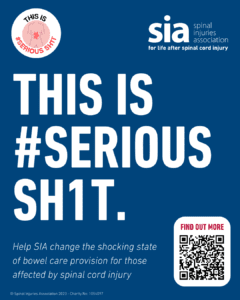Campaigning
This is #SeriousSh1t

Nurses, carers, charities and politicians are all backing a major campaign by SIA to stop SCI patients suffering harmful neglect because they are being denied essential bowel care in medical settings.

Imagine ….. you are unwell, trapped in bed. Despite asking for help you have been told you cannot go to the toilet. You have been put in a nappy and told you must open your bowels in that and wait for someone to come and clean you up …. When they are free!
Your skin becomes sore and almost burnt from your own excrement. The bacteria from your poo has entered your bladder and you are becoming more unwell due to a bladder infection, with a risk of septicaemia. After a while you start to become constipated and your abdomen becomes so bloated that it is now difficult for you to breathe and you are developing a chest infection.
Your family and associates are willing to come in and help you go the toilet but they are not allowed.
Your bowel is becoming so full that there is a serious risk of bowel perforation but before this occurs you are terrified because you know if this doesn’t kill you then the risk of your blood pressure reaching such high levels could kill you anyway but no one is listening.
You lay in the bed with all sense of dignity and control lost…. helpless.
Imagine ………
As many SCI people know only too well, this isn’t a scenario they need to imagine because it’s all too real for them. And we hear similar versions of this every week through our telephone support line, our clinical specialists and our support network.
Many will be shocked and appalled to hear some of the stories we are going to be sharing as part of our campaign, but this is the reality of life for far too many spinal cord injured people.
A spinal cord injury does not just affect the ability to walk, but all bodily functions below the point of injury including bladder and bowel function. SCI people need interventions to help them empty their bowels at a convenient time to prevent constipation and incontinence.
In our ‘What Matters?’ survey in 2022, 72% of respondents said they faced bowel management challenges in their life
Often, SCI people rely on another person to undertake these interventions – and that can be a huge problem when SCI people have to go into healthcare settings, because healthcare professionals require training to understand the importance of and how to deliver these intimate care requirements.
Poor bowel care can .. have significant mental and emotional effects, with a decreased quality of life, social isolation, and depression. It is so important to get it right
Mohammed Belal, consultant urological surgeon at University Hospital Birmingham
This widespread failure of care stems from a combination of a lack of policy and a lack of training for far too many healthcare professionals. An article in the Nursing Times on continence care in March 2023 cited a 2022 report from the National Institute for Health and Care Research which stated:
“a significant barrier to progress is the lack of training for ward staff in continence care”
We conducted a Freedom of Information request to all NHS England Trusts, the Welsh Health Boards and the Health and Social Care Trusts in Northern Ireland. Of the 123 NHS trusts across England we wrote too, only 54 reported having a formal written policy for dealing with the specialist bowel care required for those with a spinal cord injury. What’s more 26 trusts admitted they had no bowel assessment and management policy in place at all, with 40 trusts saying they had no ward-based staff skilled in supporting these patients.
The FOI revealed that 65 trusts said they didn’t have a policy that allows for the personal care assistants/carers to assist with the bowel care element of the patient’s care. However, 21 trusts said they did have a policy that allows this to happen. 37 Trusts in total either didn’t respond or declined to comment on this FOI request.
Only 21 NHS England Trusts allow the personal care assistants/carers of SCI people to assist with the bowel care element of the patient’s care
This situation has to change.
Mohammed Belal a consultant urological surgeon at University Hospital Birmingham who sustained a SCI after being struck by a tree in 2021 said:
“Personally, the hardest part of my spinal cord injury journey was the bowel care. Correct bowel care is crucial for people with spinal cord injuries to prevent severe physical complications such as constipation and bowel obstruction. Poor bowel care can also have significant mental and emotional effects, with a decreased quality of life, social isolation, and depression. It is so important to get it right.”
We’re campaigning to raise this issue at the highest level, and call for action to ensure NHS healthcare providers have a fully implemented bowel care policy in place. The Royal College of Nursing are also keen to work with us on what they believe is a vital campaign:
“No healthcare professional should be expected to carry out specialist procedures without the correct training or support. We acknowledge standards of care need to change and the Royal College of Nursing support the training of more healthcare professionals in specialist bowel care technique so that no patient suffers both the physical and mental consequences of poor bowel care.”
Fiona le Ber, chair of the RCN’s bowel and bladder forum
Speaking about the campaign, Dave Bracher our campaigns manager said:
“We understand that change won’t happen overnight, but we will continue to actively campaign on this issue until we see an end to this needless suffering. It’s time we were all more open about bowel care but unfortunately, it’s still a subject that patients feel embarrassed to discuss. Many will be shocked and appalled to hear some of the stories we are going to be sharing as part of our campaign, but this is the reality of life for far too many spinal cord injured people. This is Serious Sh1t.”
Support our campaign
If you want to support this vital campaign, for example by writing to your MP about this issue or by contacting your local healthcare provider to see what bowel care policy they have in place, please contact Dave at [email protected]
We also have a number of posters available, click on the image to download.
As part of this campaign, we also want to encourage all people with SCI to have an emergency care plan (ECP) in place, so that your essential care needs are clearly documented if you ever have to be admitted into hospital. Click the button below for more details and an appointment booking form.


